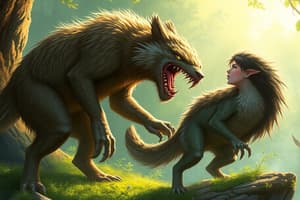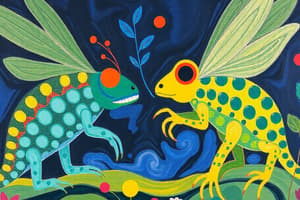Podcast
Questions and Answers
What is a species?
What is a species?
A group of organisms that share genes in nature, i.e. they can reproduce.
What does interspecific interactions/symbioses refer to?
What does interspecific interactions/symbioses refer to?
Close relationships between organisms of different species.
What is commensalism?
What is commensalism?
(+,0) One species benefits while the other is unharmed.
What is mutualism?
What is mutualism?
What describes parasitism/predation?
What describes parasitism/predation?
What is competition in the context of interspecific interactions?
What is competition in the context of interspecific interactions?
What is camouflage?
What is camouflage?
What is mimicry?
What is mimicry?
What does ingestion of poison mean in the context of defense from predation?
What does ingestion of poison mean in the context of defense from predation?
What is the red queen hypothesis?
What is the red queen hypothesis?
What is the competitive exclusion principle according to Gause?
What is the competitive exclusion principle according to Gause?
Flashcards are hidden until you start studying
Study Notes
Organisms and Species
- Species are defined as a group of organisms that can share genes naturally and reproduce with one another.
Interspecific Interactions
- Involves close relationships between different species, categorized into four main types.
Commensalism
- Relationship type: (+,0); one species benefits while the other remains unharmed.
- Example: Barnacles attach to whales, gaining mobility and access to food without impacting the whale.
Mutualism
- Relationship type: (+,+); both species receive benefits from the interaction.
- Example: Bees pollinate flowers while acquiring nectar, facilitating reproduction for the flowers.
Parasitism / Predation
- Relationship type: (+,-); one species benefits at the expense of the other, which is harmed or killed.
- Example: Giraffes consume plants, affecting plant populations negatively.
Competition
- Relationship type: (-,-); both species experience harm due to resource contestation.
- Example: Lions and hyenas compete for prey such as gazelles and zebras, resulting in decreased success for both.
Defense Mechanisms Against Predation
- Camouflage: Organisms blend into their environments to evade detection by predators.
- Mimicry: Species imitate the appearance or behaviors of more formidable organisms to deter predators.
- Ingestion of Poison: Some organisms become unpalatable when consumed, discouraging predators from eating them again.
Red Queen Hypothesis
- Suggests that organisms must continuously adapt through genetic diversity to survive rapidly changing environments, supporting longevity by ensuring not all individuals are affected by sudden environmental shifts.
Competitive Exclusion Principle (Gause)
- States that two species cannot coexist with identical niches; outcomes include:
- Extinction of one species.
- Extinction in one area for one species while the other continues elsewhere.
- Character displacement where species evolve to occupy different niches and reduce competition.
Studying That Suits You
Use AI to generate personalized quizzes and flashcards to suit your learning preferences.




